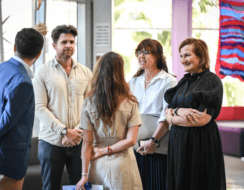03 Aug 2016
NewsSocial support eases settlement challenges for refugee women
SSI’s Women at Risk Committee developed the social support group, in partnership with CORE Community Services through its Multicultural Communities service, as a means for refugee women to build social connections, while also receiving important information that will help with their settlement.
External facilitators present to the group each week on topics that change each term based on feedback from participants. The terms run for six to eight weeks and have so far covered topics including employment and health.
The group is currently in the middle of an eight-week Families In Cultural Transition (FICT) program that covers families, money, children, gender, trauma and young people in an Australian context, and is delivered by bilingual cultural educators from the NSW Service for the Treatment and Rehabilitation of Torture and Trauma Survivors (STARTTS).
Syrian refugee Sokaina Badal said she enjoyed coming along to the group each week because it helped to improve her understanding of life in Australia.
“Today we spoke about families and how to raise children,” Ms Badal said. “I’m not married but I enjoyed hearing from the other women and learning about the differences here in Australia.”
“I enjoy interacting with the other women and also finding out about the systems and culture of Australia. I’ve made friends with some of the women who attend and I like seeing them each week.”
SSI Manager Humanitarian Support Services Yamamah Agha said the group was a good way for vulnerable women to develop the social skills and networks that lead to better settlement outcomes.
“Under the HSS program, SSI provides new arrivals with practical support to help them settle in Australia, but we’ve also recognised the benefits strong social networks can deliver during that process.
“There are many things that seem confusing and foreign when settling in a new country, so having friends who are going through similar experiences can help women to feel more supported while dealing with these challenges,” she said.
The information women receive in the group sessions complements the tailored case management support they receive from SSI, which helps to connect women with links and services in their community such as social groups, employment, education and health.
“Participants have made new friends and even reconnected with women they knew back in their home countries, all while absorbing important information in a relaxed environment where they feel comfortable asking questions,” she said.
CORE Women Settlement Worker Rowena Assaad said the project targeted vulnerable women who had migrated to Australia from war-torn countries and are dealing with low self-esteem and other issues.
“Women have told us how this group activity has helped them become more independent and confident in navigating services and integrating in the Australian society,” she said.
The social support group began with less than a dozen participants but has proven so popular that SSI and CORE are now looking to move to a larger venue to extend the group’s benefits to more new arrivals.
More than 20 women regularly attend sessions, with interest growing thanks to word of mouth, referrals from partner organisations, and success stories from existing participants.


